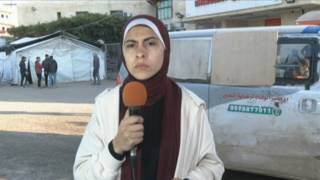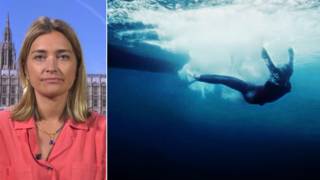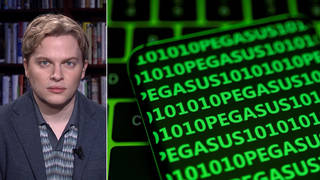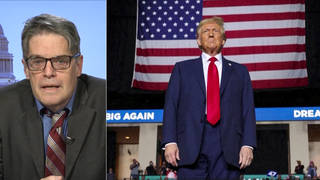HeadlinesJuly 02, 2007
Up to 80 Afghan Civilians Killed in NATO Attack
The civilian death toll from a NATO bombing in Afghanistan Friday could run as high as 80. The attack came on a village in Helmand province where NATO says it was ambushed by Taliban fighters. Witnesses reported the bombing lasted up to three hours, with dozens of women and children among the dead. NATO has faced growing criticism for a series of attacks that have killed Afghan civilians. Afghan President Hamid Karzai has criticized the U.S.-led coalition for “use of extreme force” and viewing Afghan lives as “cheap.” More than 200 Afghan civilians were killed in NATO attacks last month. Earlier today Afghanistan’s Independent Human Rights Commission said it now believes more Afghan civilians have been killed in NATO attacks than by the Taliban so far this year.
U.S. Accused of Killing 8 Civilians in Sadr City Raid
Meanwhile in Iraq, U.S. forces are being accused of blindly firing on innocents in an attack on Sadr City. Local hospital officials say eight civilians were killed in their homes. Iraqi Prime Minister Nouri al-Maliki renewed his call for the U.S. military to seek his approval before carrying out similar raids.
2 U.S. Troops Charged in Baghdad Killings
In other Iraq news, two U.S. soldiers have been charged in the separate killings of three Iraqis near Baghdad. Both of the accused suspects are charged with premeditated murder and then planting a weapon to cover up the alleged crime.
U.N. Disbands Iraqi Weapons Inspections Unit
In other Iraq news, the search for Saddam Hussein’s weapons of mass destruction has officially come to an end. The United Nations has disbanded its weapons inspection unit in Iraq. The U.N. Monitoring, Verification and Inspection Commission, UNMOVIC, was a key factor in the lead-up to the Iraq War. The inspectors were effectively sidelined and forced to leave when a U.S. attack seemed inevitable. No weapons have been found. U.S. Ambassador Zalmay Khalilzad addressed the White House dismissal of the inspectors in the rush to war.
U.S. Ambassador to U.N. Zalmay Khalilzad: “We’ve all learned lessons in hindsight. One would have hoped to have had in both cases more precise information. We have to recognize this took place in the context of post-9/11, where concerns were heightened about the potential of weapons of mass destruction falling into the hands of terrorists.”
Supreme Court to Hear Gitmo Challenge
The Supreme Court has decided to consider whether prisoners at Guantanamo Bay have the right to challenge their imprisonment. The decision reverses the court’s refusal in April to hear an appeal from detainees at Guantanamo challenging the Military Commissions Act of 2006. The law stripped detainees of the right to habeas corpus. Court staffers say the decision marks the first time in 60 years justices have agreed to hear an appeal they initially rejected. Michael Ratner of the Center for Constitutional Rights said: “The Supreme Court will now seek for the third time to resolve the fate of these detainees … who have languished without any meaningful way to challenge their detention for more than five years. The processes the government put in place are a sham — they allow the use of evidence obtained through torture and no real review of the facts.”
Leahy Vows to Seek Contempt Citation, Court Ruling over Subpoena Refusals
Senate Judiciary Committee Chair Patrick Leahy has announced he’s prepared to go to court and seek a congressional contempt vote if the Bush administration resists subpoenas for information on the firing of nine U.S. attorneys. The White House announced last week President Bush will invoke executive privilege to deny access to documents from former presidential counsel Harriet Miers and former political director Sara Taylor. Leahy responded in an interview on the Sunday talk show Meet the Press.
Sen. Patrick Leahy: “If they don’t cooperate, yes, I’d go that far. I mean, this is very important to the American people.”
5 Arrested in U.K. Bombing Plot
In Britain, five people were arrested Sunday in an ongoing investigation into a failed car-bombing attempt in London and another in Scotland. On Friday, police found two Mercedes containing gasoline, gas cylinders and nails parked near the other in London. One day later, two people were arrested after a car crashed into the main terminal at Glasgow airport. Witness Jim Manson described the attack.
Jim Manson: “It started out with some flames coming up from the front of the car, but then it was almost as if there was kind of a mini explosion, as if there’d be a petrol canister or something, and the flames were shooting right up to the top of the terminal building, which was quite dramatic. And then the terminal building seemed to catch fire. The front of the terminal building seemed to catch fire, and there was smoke and flames obviously going inside and outside, as well. Everyone just ran. I mean, they were absolutely terrified, as you can imagine.”
Meanwhile, British Prime Minister Gordon Brown said the attacks indicate links to al-Qaeda and announced increased security measures at airports.
British PM Gordon Brown: “We will have to be constantly vigilant. We will have to be alert at all times. And I think the message that’s going to come out from Britain and from the British people is that as one, we will not yield, we will not be intimidated, and we will not allow anyone to undermine our British way of life.”
Lieberman: U.K. Incident Should Drop Spy Opposition
Meanwhile here in the United States, Senator Joe Lieberman of Connecticut said the bombing plots should encourage lawmakers to drop opposition to the Bush administration’s domestic spying on U.S. citizens. Speaking on ABC’s This Week, Lieberman said: “I hope these terrorist attacks in London wake us up here in America to stop the petty partisan fighting going on about … electronic surveillance.”
Castro: CIA Admissions Mask Ongoing Activities
In Cuba, President Fidel Castro has weighed in for the first time on the CIA’s publication of its so-called “family jewels” last week. A trove of unearthed documents showed the CIA planned spy operations and attempts on Castro’s life, including a plot hatched with two wanted mobsters. In an editorial called “Killing Machine,” Castro writes: “Everything described in the documents is still being done, only in a more brutal manner around the entire planet, including an increasing number of illegal actions in the very United States.” Cuba’s National Assembly also reacted to the disclosures with a statement at its opening bi-annual session.
Cuban National Assembly President Ricardo Alarcon: “The CIA documents reveal part of the attempts to assassinate our colleague Fidel Castro and to bring pain to our country. The cynical support given to Posada and the shameful punishment to our five anti-terrorist fighters is irrefutable evidence that those now recognized vile purposes are not a thing of the past and that they continue to be the current policies of the actual U.S. government.”
Castro’s chair was left symbolically empty as he continues to recover from intestinal surgery.
Israel Transfers Fraction of Owed Palestinian Funds
In Israel and the Occupied Territories, Israel has begun transferring some of the hundreds of millions of dollars in Palestinian tax money it’s frozen for more than a year. The initial sum of $120 million is just a fraction of the total amount Palestinians are owed. The money will go to the government of Palestinian President Mahmoud Abbas in the West Bank, with none to Hamas-controlled Gaza. Hamas says Israel is trying to intensify the Palestinian divide by increasing Gaza’s isolation. Meanwhile, aid convoys into Gaza continue to move at a trickle pace.
U.N. Humanitarian Coordinator John Ging: “There never was a greater need for us, and yet it was never more difficult to deliver the assistance. But that is our challenge, and we will strive to succeed in that challenge. And I hope that all others, in their respective challenges, the political challenge and so on and so forth, that they too succeed to find solutions that will take the situation forward to a better future.”
1,000 Protest Bush-Putin Meeting in Maine
And Russian President Vladimir Putin is in the United States for informal meetings with President Bush. The two are meeting at the Bush family compound in Kennebunkport, Maine. As Putin arrived, more than 1,000 people demonstrated in a nearby town against the war in Iraq and ongoing Russian policy in Chechnya.
Most popular
- 1
- 2
- 3
- 4
Non-commercial news needs your support
Please do your part today.











Media Options